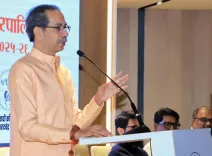Will Joe Root Be the Key for England in the Ashes?

Synopsis
Key Takeaways
- Joe Root's performance will be pivotal for England in the Ashes.
- England's bowling strength could determine the series outcome.
- Warner's insights highlight the challenges faced by Root.
- Returning players like Jofra Archer are crucial for England's strategy.
- The Ashes series is a significant event for national pride.
New Delhi, Aug 2 (NationPress) Former Australia opener David Warner is confident that Joe Root will play a pivotal role for England during their upcoming tour to Australia for the five-Test Ashes series later this year.
Root has fallen victim to Australia fast bowler Josh Hazlewood on 10 occasions across 18 Tests, just one fewer than the 11 times he has been dismissed by Australia captain Pat Cummins and India bowler Jasprit Bumrah. The current World No. 1 Test batter has yet to achieve a century in Australia and boasts an average of 35.86 while playing there.
"The key player for them is Rooty (England batter Joe Root), who has yet to reach a hundred in Australia. Josh Hazlewood often has his number. He’ll need to adjust his stance and take the surfboard off his front leg,” Warner shared with BBC Sport.
England fans can take solace in the return of Jofra Archer and Gus Atkinson, both of whom could be instrumental if they aim to reclaim the Ashes urn after a decade-long wait.
“It ultimately hinges on the bowlers. If the English bowlers can disrupt the Australian top order, they will be in the contest,” Warner emphasized.
Currently, Warner is in England preparing to play for the London Spirit in The Hundred, which kicks off on August 5. The seasoned left-handed batter is eager to bring enthusiasm and intensity to the pitch, hoping to deliver an exciting performance for the fans.
“I know the Spirit haven't had much success in recent years. My goal is to inject energy and intensity into the team and reflect that on the field. It’s about the fans and the young ones coming to watch us, not just about individual players or past histories,” he concluded.










